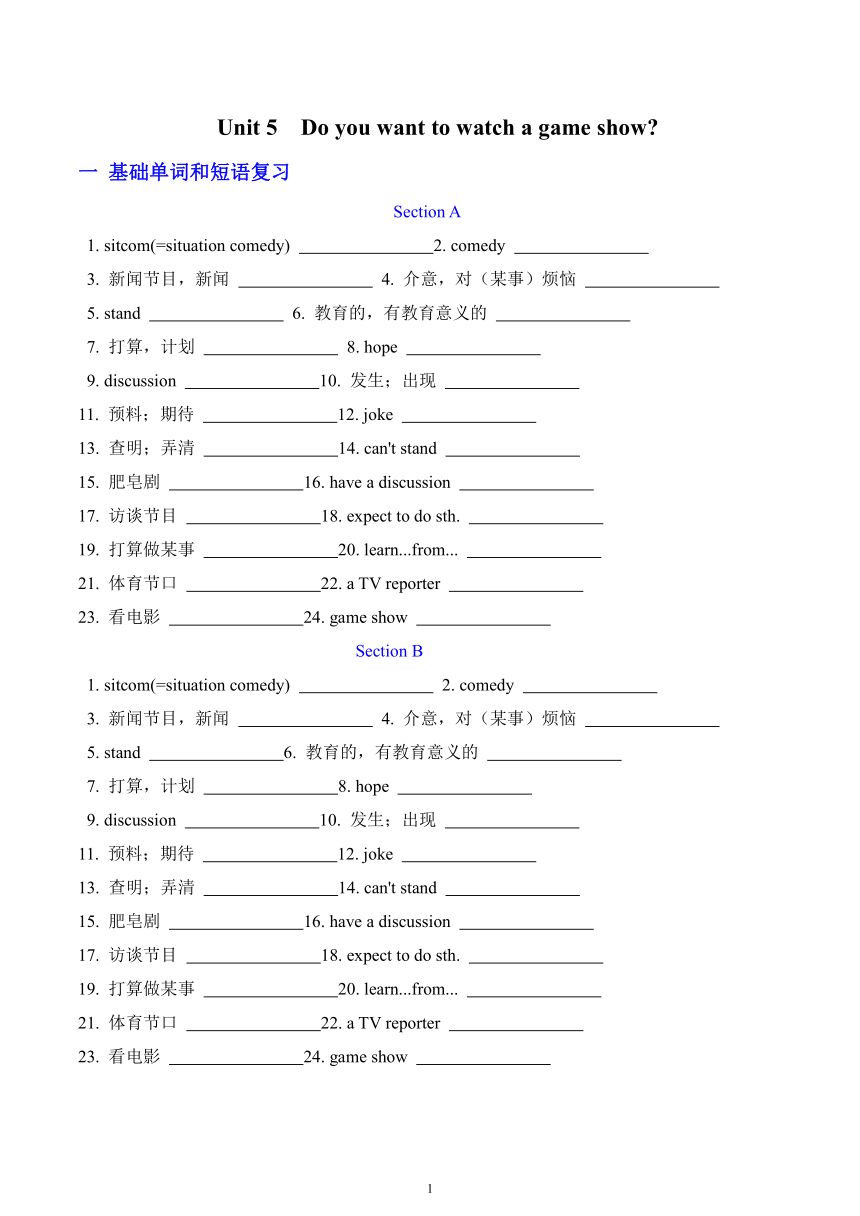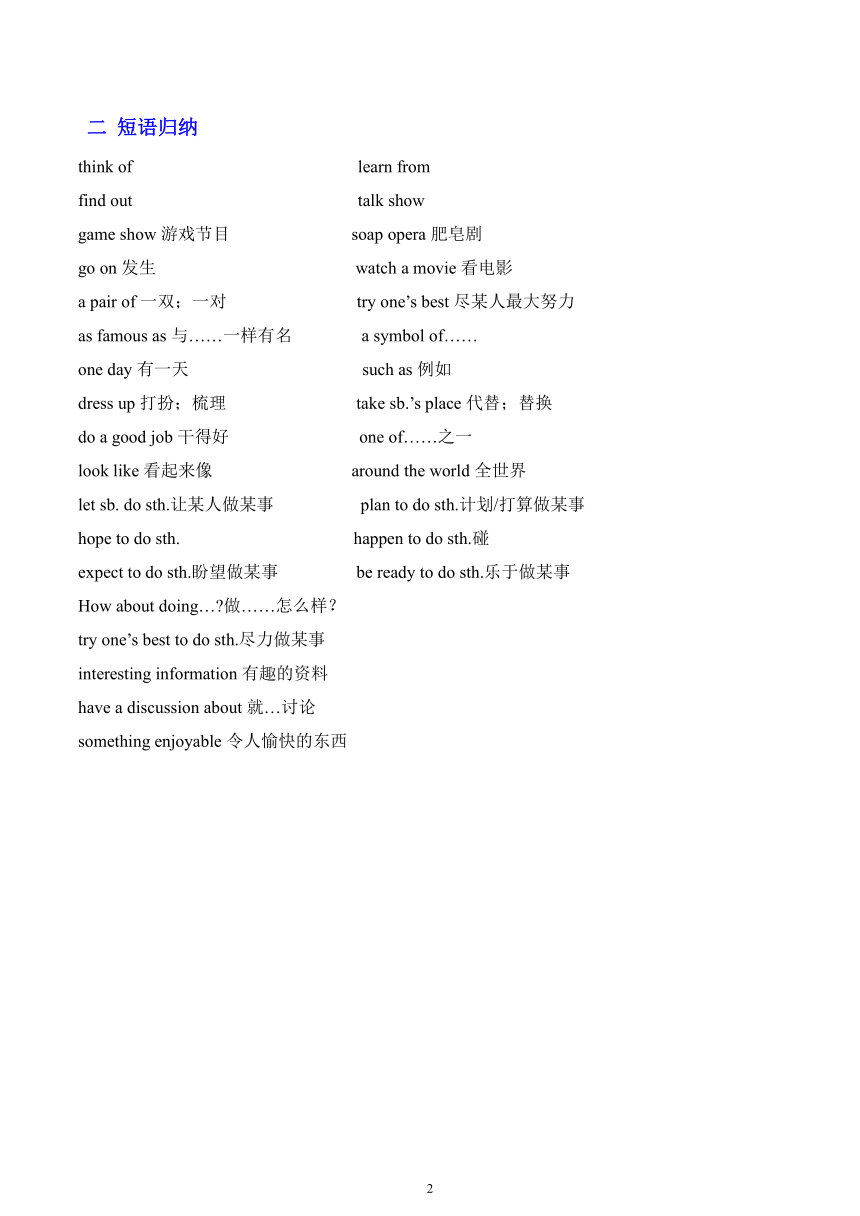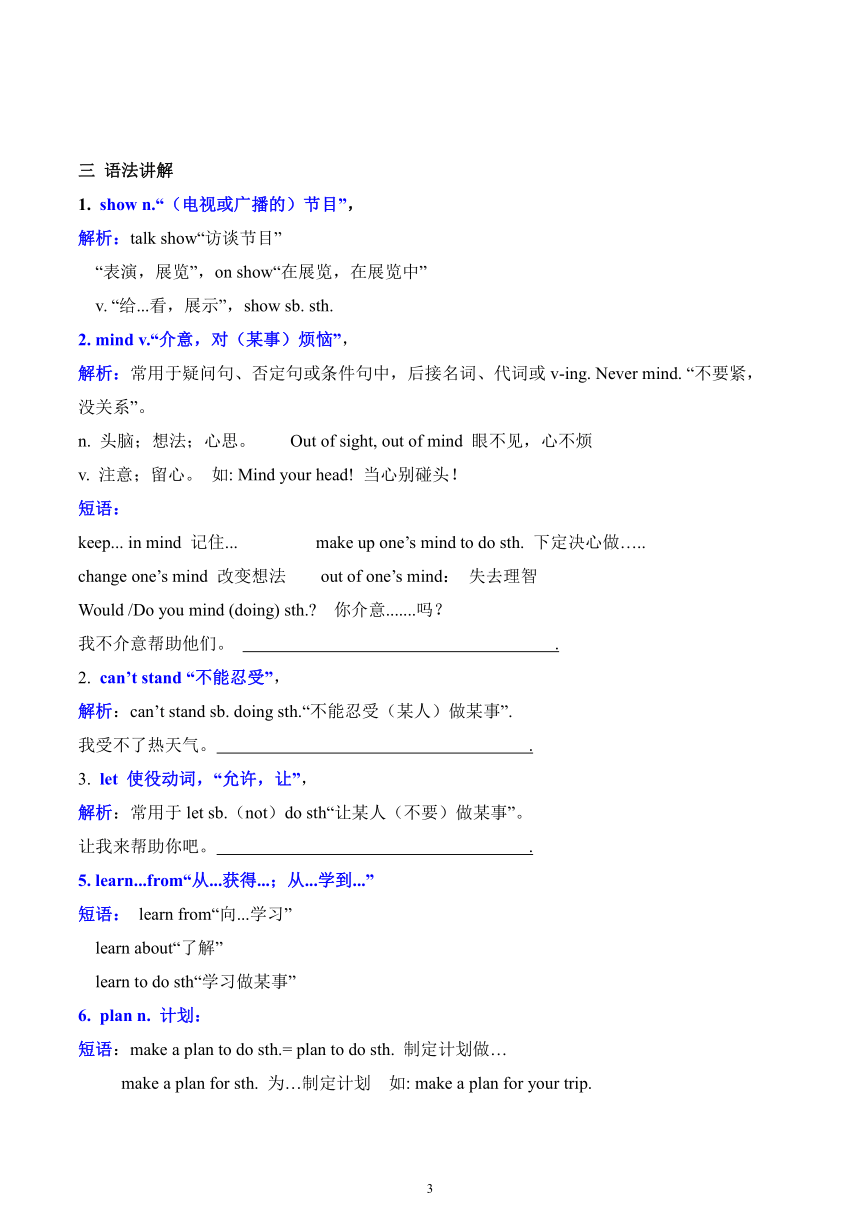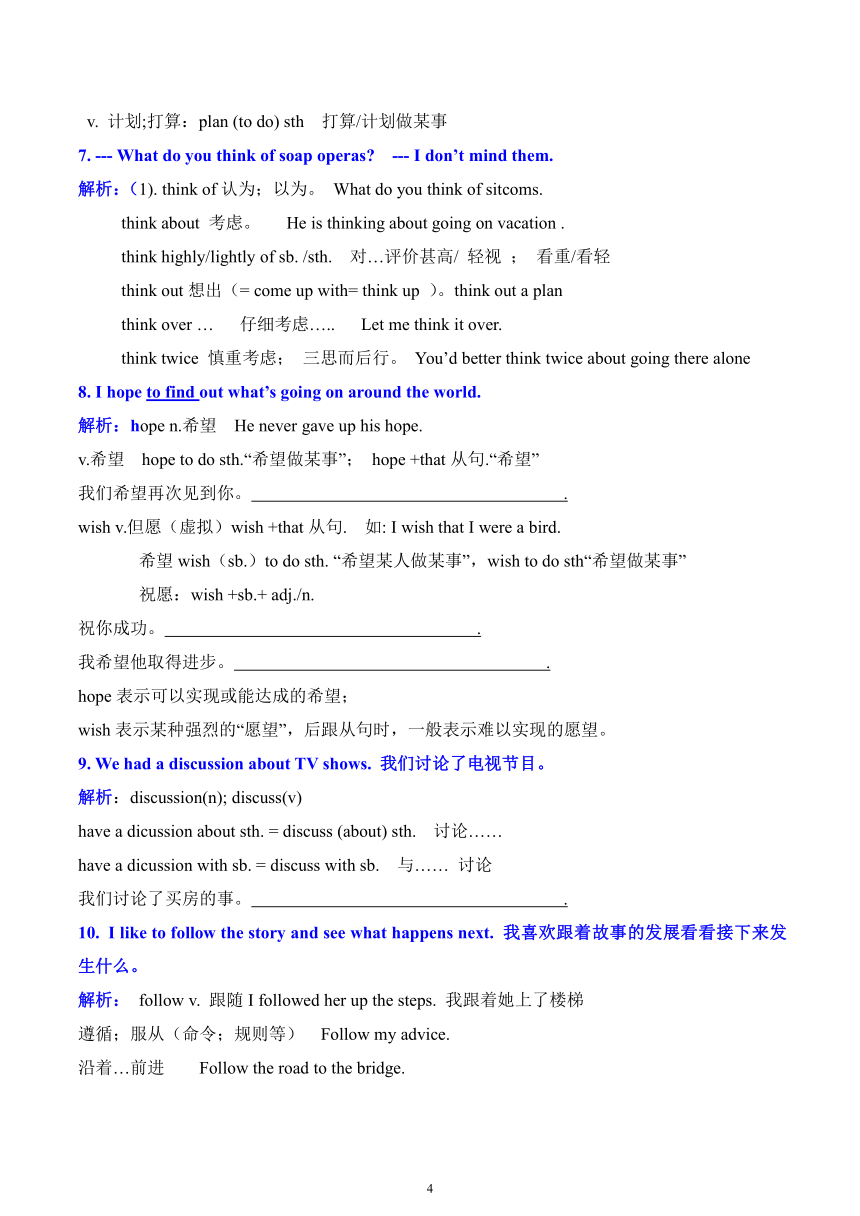人教版八年级上册 Unit 5 Do you want to watch a game show? 知识清单
文档属性
| 名称 | 人教版八年级上册 Unit 5 Do you want to watch a game show? 知识清单 |  | |
| 格式 | doc | ||
| 文件大小 | 90.0KB | ||
| 资源类型 | 教案 | ||
| 版本资源 | 人教新目标(Go for it)版 | ||
| 科目 | 英语 | ||
| 更新时间 | 2024-01-05 20:18:32 | ||
图片预览




文档简介
Unit 5 Do you want to watch a game show
一 基础单词和短语复习
Section A
1. sitcom(=situation comedy) 2. comedy
3. 新闻节目,新闻 4. 介意,对(某事)烦恼
5. stand 6. 教育的,有教育意义的
7. 打算,计划 8. hope
9. discussion 10. 发生;出现
11. 预料;期待 12. joke
13. 查明;弄清 14. can't stand
15. 肥皂剧 16. have a discussion
17. 访谈节目 18. expect to do sth.
19. 打算做某事 20. learn...from...
21. 体育节口 22. a TV reporter
23. 看电影 24. game show
Section B
1. sitcom(=situation comedy) 2. comedy
3. 新闻节目,新闻 4. 介意,对(某事)烦恼
5. stand 6. 教育的,有教育意义的
7. 打算,计划 8. hope
9. discussion 10. 发生;出现
11. 预料;期待 12. joke
13. 查明;弄清 14. can't stand
15. 肥皂剧 16. have a discussion
17. 访谈节目 18. expect to do sth.
19. 打算做某事 20. learn...from...
21. 体育节口 22. a TV reporter
23. 看电影 24. game show
二 短语归纳
think of learn from
find out talk show
game show游戏节目 soap opera肥皂剧
go on发生 watch a movie看电影
a pair of一双;一对 try one’s best尽某人最大努力
as famous as与……一样有名 a symbol of……
one day有一天 such as例如
dress up打扮;梳理 take sb.’s place代替;替换
do a good job干得好 one of……之一
look like看起来像 around the world全世界
let sb. do sth.让某人做某事 plan to do sth.计划/打算做某事
hope to do sth. happen to do sth.碰
expect to do sth.盼望做某事 be ready to do sth.乐于做某事
How about doing… 做……怎么样?
try one’s best to do sth.尽力做某事
interesting information有趣的资料
have a discussion about就…讨论
something enjoyable令人愉快的东西
三 语法讲解
show n.“(电视或广播的)节目”,
解析:talk show“访谈节目”
“表演,展览”,on show“在展览,在展览中”
v. “给...看,展示”,show sb. sth.
2. mind v.“介意,对(某事)烦恼”,
解析:常用于疑问句、否定句或条件句中,后接名词、代词或v-ing. Never mind. “不要紧,没关系”。
n. 头脑;想法;心思。 Out of sight, out of mind 眼不见,心不烦
v. 注意;留心。 如: Mind your head! 当心别碰头!
短语:
keep... in mind 记住... make up one’s mind to do sth. 下定决心做…..
change one’s mind 改变想法 out of one’s mind: 失去理智
Would /Do you mind (doing) sth. 你介意.......吗?
我不介意帮助他们。 .
can’t stand “不能忍受”,
解析:can’t stand sb. doing sth.“不能忍受(某人)做某事”.
我受不了热天气。 .
let 使役动词,“允许,让”,
解析:常用于let sb.(not)do sth“让某人(不要)做某事”。
让我来帮助你吧。 .
5. learn...from“从...获得...;从...学到...”
短语: learn from“向...学习”
learn about“了解”
learn to do sth“学习做某事”
plan n. 计划:
短语:make a plan to do sth.= plan to do sth. 制定计划做…
make a plan for sth. 为…制定计划 如: make a plan for your trip.
v. 计划;打算:plan (to do) sth 打算/计划做某事
7. --- What do you think of soap operas --- I don’t mind them.
解析:(1). think of认为;以为。 What do you think of sitcoms.
think about 考虑。 He is thinking about going on vacation .
think highly/lightly of sb. /sth. 对…评价甚高/ 轻视 ; 看重/看轻
think out想出(= come up with= think up )。think out a plan
think over … 仔细考虑….. Let me think it over.
think twice 慎重考虑; 三思而后行。 You’d better think twice about going there alone
8. I hope to find out what’s going on around the world.
解析:hope n.希望 He never gave up his hope.
v.希望 hope to do sth.“希望做某事”; hope +that从句.“希望”
我们希望再次见到你。 .
wish v.但愿(虚拟)wish +that从句. 如: I wish that I were a bird.
希望wish(sb.)to do sth. “希望某人做某事”,wish to do sth“希望做某事”
祝愿:wish +sb.+ adj./n.
祝你成功。 .
我希望他取得进步。 .
hope表示可以实现或能达成的希望;
wish表示某种强烈的“愿望”,后跟从句时,一般表示难以实现的愿望。
9. We had a discussion about TV shows. 我们讨论了电视节目。
解析:discussion(n); discuss(v)
have a dicussion about sth. = discuss (about) sth. 讨论……
have a dicussion with sb. = discuss with sb. 与…… 讨论
我们讨论了买房的事。 .
I like to follow the story and see what happens next. 我喜欢跟着故事的发展看看接下来发生什么。
解析: follow v. 跟随I followed her up the steps. 我跟着她上了楼梯
遵循;服从(命令;规则等) Follow my advice.
沿着…前进 Follow the road to the bridge.
理解;听清楚(sb) You speak too fast for me to follow.
happen v.发生。一般指偶然发生,其主语是事,而不是人,常用结构:Sth. happens to sb.“某人发生了某事”。 Sth. happens + 时间/地点 “某时/某地发生了某事”。
happen 还可以表示“碰巧”,此时主语可以是人。sb. happens to do sth. “某人碰巧做某事”。
昨天他哥哥发生了一起交通事故。 .
昨天街上发生了一起事故。 .
我碰巧在接受预见了我叔叔。 .
happen “发生;碰巧”,一般用于偶然或突发性事件。
take place “发生;举行;举办”,一般指非偶然性事件的发生,即这种事件的发生有某种原因或安排。
may情态动词,意为“可能;也许;大概”。
解析:may的否定形式为may not,表示可能性时,意为“可能不”
你的票可能在你的书包里。 .
他可能不知道答案。 .
may表示“许可;准许”时,与can同义,两可以互换使用。
expect动词,意为“预料;期待”。
解析:expect to do sth.是固定结构,意为“期望做某事”。
我弟弟期望成为一名最优秀的表演者。 .
expect还可用于下列结构:
①expect+名词/代词,意为“期待某事(物)或某人”。
我正盼着李林的来信。 .
②expect sb. to do sth.期望某人做某事
我盼望妈妈早点儿回来。 .
③expect+that从句
我预计会下周一回来。 .
13. find 找到;发现 如: I found a wallet lying on the ground. 我发现一只钱包掉在地上
认为;发觉 如: I found it necessary to take exercise.
find out :查明;弄清楚 如: You’d better find out who broke the window.
look for :寻找 如: They looked for it everywhere, but they didn’t find it
14. go on 发生(happen):What’s going on here
进展:How did you go on in your study 你的学习进展得怎么样?
继续 同一件事:go on doing sth. = go on with sth. it will go on raining all day.
另一件事: go on to do sth. 如: Stop reading. Let’s go on to answer the question.
joke 可数名词,
解析:“笑话;玩笑”。常用短语:
tell jokes/a joke“讲笑话” play a joke on sb. “开某人的玩笑”
汤姆刚刚和我开了个玩笑。 .
16. one day 将来或过去的某一天
some day 将来的某一天
17. meaningless “毫无意义的”,反义词meaningful“意味深长的,有意义的”。
18 famous adj. “著名的;出名的”
短语:be famous for... 因.......而出名。
be famous as... 作为.......而出名。
be famous to... 为......而熟知
屠呦呦作为一名伟大的科学家而出名。 .
米老鼠为全世界的孩子所熟知。 .
中国因悠久的历史而闻名。 .
19. appear 出现;露面
我的朋友们直到七点才到。 .
come out 发行,出版。
我的第一本书与20003年出版了。 .
出来,出现。太阳要出来了。 .
开花,发芽。有些花开始开了。 .
透露,传出。事情终于真相大白了。 .
21. He become very rich and successful.
解析:become连系动伺。意为“开始变得;变成”,后接名词或形容词作表语,其过去式为becane
他成为了最优秀的演员之一。 .
我们的学校变得越来越漂亮了。 .
rich形容词,意为“富有的”,其反义词为poor“贫穷的”。
他出身于富裕家庭。 .
successful 形容词,“获得成功的,有成就的”。
22. In the 1930s,he made 87 cartoons with Mickey.在20世纪30年代,他制作了87部米老鼠卡通片。
解析:in the 1930s意为“在20世纪30年代”,表示“在....世纪....年代”要用"in+the+年份-s/-'s”。在20世纪70年代
23. Some people might ask how this cartoon animal became so popular.一些人可能问这个卡通动物是怎么变得如此受欢迎的。
解析:might情态动词,意为“可能;可以”,表示推测或许可,语气较弱。
他说我可以借他的书。 .
18. One of the main reasons is that Mickey was like a common man, but he always tried to face any danger.主要的原因之一是米老鼠像个普通人,但他总是全力以赴地去面对任何危险。
解析: (1) reason用作可数名词,意为“原因;理由”。
你为什么没给出任何理由 .
the/a reason for (doing) sth. “(做)某事的理由”。
the reason why... “...的原因”
下雨不是你迟到的理由。 .
(2)face此处用作及物动词,意为“面对;接名词或代词。
每个人都必须面对困难。
①facc还可用作名词,意为“脸:面孔表情”。 make faces做鬼脸
她有一张圆脸。
②固定短语: face to face面对面
19. Micke was unlucky and had many problemssuch as losing his house or girlfriend, Minnie...米老鼠是不幸的,遇到了许多问题,比如失去他的房子或女朋友明妮。
解析: (1) unlucky形容词,意为“不幸的;不吉利的”,反义词为lucky,“幸运的”;副词形式为unluckily,“不幸地”。
在中国文化中。乌鸦是一种不吉祥的动物。 .
(2) lose动词,意为“失去;丢失”,其过去式为lost。指因事故或失去原有的东西,也可指人专心于某事。
他的奶奶失明了。
汤姆完全沉浸在阅读之中。 .
①lose还可意为“输”,其反义词是win。
他们输掉了比赛。 .
②固定搭配: lose one's way迷路; lose weight减肥; lose interest in对....失去兴趣。
20. However, he was always ready to try his best.然而,他总是准备好去尽其所能。
解析: (1 )be ready to do sth.意为“准备好做某事;愿意做某事”,其中ready用作形容词,意为“愿意的;准备好的”。
我们可以走了。 .
be ready for sth.意为“为....准备”。
我们准备好考试了。 .
(2) try one’s best “尽力;竭尽全力”。try one’s best to do sth “竭尽全力做某事”。
21. a symbol of “...的象征”
熊猫已经成为中国的象征。 .
22. She dresses up like a boy and takes her father'splace to fight in the army.她打扮成男孩模样替父从军打仗。
解析:(1)dress up意为“装扮;乔装打扮”。
女孩们喜欢装扮成公主。 .
①dress up还意为“着特殊服装;穿上盛装”。
Miss Jones dressed up for this party.为这个聚会琼斯小姐穿上了盛装。
②dress动词,意为“穿衣服;给...穿衣服”,宾语通常为人。
他够大了,可以自己穿衣服了。 .
(2) take sb.'s place=take the place of sb意为“代替;替换”。
我不得不外出,因此简替我参加了会议。 .
没有人能代替我母亲。 .
23. ..they did a good job in the movi......他们在影片中都演得很好。
解析:do a good job意为“干得好”,相当于do well,用于夸奖某人的工作或表现。
在才艺表演中她表现得很好。 .
24. ..and you want to see something enjoyable, choose Mulan! 而且你想看令人愉快的东西,就选择《花木兰》吧!
解析:something enjoyable意为“令人愉快的东西”,something是不定代词,形容词修饰不定代词时应将形容词后置。
报纸上有些有趣的事情。 .
一 基础单词和短语复习
Section A
1. sitcom(=situation comedy) 2. comedy
3. 新闻节目,新闻 4. 介意,对(某事)烦恼
5. stand 6. 教育的,有教育意义的
7. 打算,计划 8. hope
9. discussion 10. 发生;出现
11. 预料;期待 12. joke
13. 查明;弄清 14. can't stand
15. 肥皂剧 16. have a discussion
17. 访谈节目 18. expect to do sth.
19. 打算做某事 20. learn...from...
21. 体育节口 22. a TV reporter
23. 看电影 24. game show
Section B
1. sitcom(=situation comedy) 2. comedy
3. 新闻节目,新闻 4. 介意,对(某事)烦恼
5. stand 6. 教育的,有教育意义的
7. 打算,计划 8. hope
9. discussion 10. 发生;出现
11. 预料;期待 12. joke
13. 查明;弄清 14. can't stand
15. 肥皂剧 16. have a discussion
17. 访谈节目 18. expect to do sth.
19. 打算做某事 20. learn...from...
21. 体育节口 22. a TV reporter
23. 看电影 24. game show
二 短语归纳
think of learn from
find out talk show
game show游戏节目 soap opera肥皂剧
go on发生 watch a movie看电影
a pair of一双;一对 try one’s best尽某人最大努力
as famous as与……一样有名 a symbol of……
one day有一天 such as例如
dress up打扮;梳理 take sb.’s place代替;替换
do a good job干得好 one of……之一
look like看起来像 around the world全世界
let sb. do sth.让某人做某事 plan to do sth.计划/打算做某事
hope to do sth. happen to do sth.碰
expect to do sth.盼望做某事 be ready to do sth.乐于做某事
How about doing… 做……怎么样?
try one’s best to do sth.尽力做某事
interesting information有趣的资料
have a discussion about就…讨论
something enjoyable令人愉快的东西
三 语法讲解
show n.“(电视或广播的)节目”,
解析:talk show“访谈节目”
“表演,展览”,on show“在展览,在展览中”
v. “给...看,展示”,show sb. sth.
2. mind v.“介意,对(某事)烦恼”,
解析:常用于疑问句、否定句或条件句中,后接名词、代词或v-ing. Never mind. “不要紧,没关系”。
n. 头脑;想法;心思。 Out of sight, out of mind 眼不见,心不烦
v. 注意;留心。 如: Mind your head! 当心别碰头!
短语:
keep... in mind 记住... make up one’s mind to do sth. 下定决心做…..
change one’s mind 改变想法 out of one’s mind: 失去理智
Would /Do you mind (doing) sth. 你介意.......吗?
我不介意帮助他们。 .
can’t stand “不能忍受”,
解析:can’t stand sb. doing sth.“不能忍受(某人)做某事”.
我受不了热天气。 .
let 使役动词,“允许,让”,
解析:常用于let sb.(not)do sth“让某人(不要)做某事”。
让我来帮助你吧。 .
5. learn...from“从...获得...;从...学到...”
短语: learn from“向...学习”
learn about“了解”
learn to do sth“学习做某事”
plan n. 计划:
短语:make a plan to do sth.= plan to do sth. 制定计划做…
make a plan for sth. 为…制定计划 如: make a plan for your trip.
v. 计划;打算:plan (to do) sth 打算/计划做某事
7. --- What do you think of soap operas --- I don’t mind them.
解析:(1). think of认为;以为。 What do you think of sitcoms.
think about 考虑。 He is thinking about going on vacation .
think highly/lightly of sb. /sth. 对…评价甚高/ 轻视 ; 看重/看轻
think out想出(= come up with= think up )。think out a plan
think over … 仔细考虑….. Let me think it over.
think twice 慎重考虑; 三思而后行。 You’d better think twice about going there alone
8. I hope to find out what’s going on around the world.
解析:hope n.希望 He never gave up his hope.
v.希望 hope to do sth.“希望做某事”; hope +that从句.“希望”
我们希望再次见到你。 .
wish v.但愿(虚拟)wish +that从句. 如: I wish that I were a bird.
希望wish(sb.)to do sth. “希望某人做某事”,wish to do sth“希望做某事”
祝愿:wish +sb.+ adj./n.
祝你成功。 .
我希望他取得进步。 .
hope表示可以实现或能达成的希望;
wish表示某种强烈的“愿望”,后跟从句时,一般表示难以实现的愿望。
9. We had a discussion about TV shows. 我们讨论了电视节目。
解析:discussion(n); discuss(v)
have a dicussion about sth. = discuss (about) sth. 讨论……
have a dicussion with sb. = discuss with sb. 与…… 讨论
我们讨论了买房的事。 .
I like to follow the story and see what happens next. 我喜欢跟着故事的发展看看接下来发生什么。
解析: follow v. 跟随I followed her up the steps. 我跟着她上了楼梯
遵循;服从(命令;规则等) Follow my advice.
沿着…前进 Follow the road to the bridge.
理解;听清楚(sb) You speak too fast for me to follow.
happen v.发生。一般指偶然发生,其主语是事,而不是人,常用结构:Sth. happens to sb.“某人发生了某事”。 Sth. happens + 时间/地点 “某时/某地发生了某事”。
happen 还可以表示“碰巧”,此时主语可以是人。sb. happens to do sth. “某人碰巧做某事”。
昨天他哥哥发生了一起交通事故。 .
昨天街上发生了一起事故。 .
我碰巧在接受预见了我叔叔。 .
happen “发生;碰巧”,一般用于偶然或突发性事件。
take place “发生;举行;举办”,一般指非偶然性事件的发生,即这种事件的发生有某种原因或安排。
may情态动词,意为“可能;也许;大概”。
解析:may的否定形式为may not,表示可能性时,意为“可能不”
你的票可能在你的书包里。 .
他可能不知道答案。 .
may表示“许可;准许”时,与can同义,两可以互换使用。
expect动词,意为“预料;期待”。
解析:expect to do sth.是固定结构,意为“期望做某事”。
我弟弟期望成为一名最优秀的表演者。 .
expect还可用于下列结构:
①expect+名词/代词,意为“期待某事(物)或某人”。
我正盼着李林的来信。 .
②expect sb. to do sth.期望某人做某事
我盼望妈妈早点儿回来。 .
③expect+that从句
我预计会下周一回来。 .
13. find 找到;发现 如: I found a wallet lying on the ground. 我发现一只钱包掉在地上
认为;发觉 如: I found it necessary to take exercise.
find out :查明;弄清楚 如: You’d better find out who broke the window.
look for :寻找 如: They looked for it everywhere, but they didn’t find it
14. go on 发生(happen):What’s going on here
进展:How did you go on in your study 你的学习进展得怎么样?
继续 同一件事:go on doing sth. = go on with sth. it will go on raining all day.
另一件事: go on to do sth. 如: Stop reading. Let’s go on to answer the question.
joke 可数名词,
解析:“笑话;玩笑”。常用短语:
tell jokes/a joke“讲笑话” play a joke on sb. “开某人的玩笑”
汤姆刚刚和我开了个玩笑。 .
16. one day 将来或过去的某一天
some day 将来的某一天
17. meaningless “毫无意义的”,反义词meaningful“意味深长的,有意义的”。
18 famous adj. “著名的;出名的”
短语:be famous for... 因.......而出名。
be famous as... 作为.......而出名。
be famous to... 为......而熟知
屠呦呦作为一名伟大的科学家而出名。 .
米老鼠为全世界的孩子所熟知。 .
中国因悠久的历史而闻名。 .
19. appear 出现;露面
我的朋友们直到七点才到。 .
come out 发行,出版。
我的第一本书与20003年出版了。 .
出来,出现。太阳要出来了。 .
开花,发芽。有些花开始开了。 .
透露,传出。事情终于真相大白了。 .
21. He become very rich and successful.
解析:become连系动伺。意为“开始变得;变成”,后接名词或形容词作表语,其过去式为becane
他成为了最优秀的演员之一。 .
我们的学校变得越来越漂亮了。 .
rich形容词,意为“富有的”,其反义词为poor“贫穷的”。
他出身于富裕家庭。 .
successful 形容词,“获得成功的,有成就的”。
22. In the 1930s,he made 87 cartoons with Mickey.在20世纪30年代,他制作了87部米老鼠卡通片。
解析:in the 1930s意为“在20世纪30年代”,表示“在....世纪....年代”要用"in+the+年份-s/-'s”。在20世纪70年代
23. Some people might ask how this cartoon animal became so popular.一些人可能问这个卡通动物是怎么变得如此受欢迎的。
解析:might情态动词,意为“可能;可以”,表示推测或许可,语气较弱。
他说我可以借他的书。 .
18. One of the main reasons is that Mickey was like a common man, but he always tried to face any danger.主要的原因之一是米老鼠像个普通人,但他总是全力以赴地去面对任何危险。
解析: (1) reason用作可数名词,意为“原因;理由”。
你为什么没给出任何理由 .
the/a reason for (doing) sth. “(做)某事的理由”。
the reason why... “...的原因”
下雨不是你迟到的理由。 .
(2)face此处用作及物动词,意为“面对;接名词或代词。
每个人都必须面对困难。
①facc还可用作名词,意为“脸:面孔表情”。 make faces做鬼脸
她有一张圆脸。
②固定短语: face to face面对面
19. Micke was unlucky and had many problemssuch as losing his house or girlfriend, Minnie...米老鼠是不幸的,遇到了许多问题,比如失去他的房子或女朋友明妮。
解析: (1) unlucky形容词,意为“不幸的;不吉利的”,反义词为lucky,“幸运的”;副词形式为unluckily,“不幸地”。
在中国文化中。乌鸦是一种不吉祥的动物。 .
(2) lose动词,意为“失去;丢失”,其过去式为lost。指因事故或失去原有的东西,也可指人专心于某事。
他的奶奶失明了。
汤姆完全沉浸在阅读之中。 .
①lose还可意为“输”,其反义词是win。
他们输掉了比赛。 .
②固定搭配: lose one's way迷路; lose weight减肥; lose interest in对....失去兴趣。
20. However, he was always ready to try his best.然而,他总是准备好去尽其所能。
解析: (1 )be ready to do sth.意为“准备好做某事;愿意做某事”,其中ready用作形容词,意为“愿意的;准备好的”。
我们可以走了。 .
be ready for sth.意为“为....准备”。
我们准备好考试了。 .
(2) try one’s best “尽力;竭尽全力”。try one’s best to do sth “竭尽全力做某事”。
21. a symbol of “...的象征”
熊猫已经成为中国的象征。 .
22. She dresses up like a boy and takes her father'splace to fight in the army.她打扮成男孩模样替父从军打仗。
解析:(1)dress up意为“装扮;乔装打扮”。
女孩们喜欢装扮成公主。 .
①dress up还意为“着特殊服装;穿上盛装”。
Miss Jones dressed up for this party.为这个聚会琼斯小姐穿上了盛装。
②dress动词,意为“穿衣服;给...穿衣服”,宾语通常为人。
他够大了,可以自己穿衣服了。 .
(2) take sb.'s place=take the place of sb意为“代替;替换”。
我不得不外出,因此简替我参加了会议。 .
没有人能代替我母亲。 .
23. ..they did a good job in the movi......他们在影片中都演得很好。
解析:do a good job意为“干得好”,相当于do well,用于夸奖某人的工作或表现。
在才艺表演中她表现得很好。 .
24. ..and you want to see something enjoyable, choose Mulan! 而且你想看令人愉快的东西,就选择《花木兰》吧!
解析:something enjoyable意为“令人愉快的东西”,something是不定代词,形容词修饰不定代词时应将形容词后置。
报纸上有些有趣的事情。 .
同课章节目录
- Unit 1 Where did you go on vacation?
- Section A
- Section B
- Unit 2 How often do you exercise?
- Section A
- Section B
- Unit 3 I'm more outgoing than my sister.
- Section A
- Section B
- Unit 4 What's the best movie theater?
- Section A
- Section B
- Unit 5 Do you want to watch a game show?
- Section A
- Section B
- Unit 6 I'm going to study computer science.
- Section A
- Section B
- Unit 7 Will people have robots?
- Section A
- Section B
- Unit 8 How do you make a banana milk shake?
- Section A
- Section B
- Unit 9 Can you come to my party?
- Section A
- Section B
- Unit 10 If you go to the party, you'll have a grea
- Section A
- Section B
